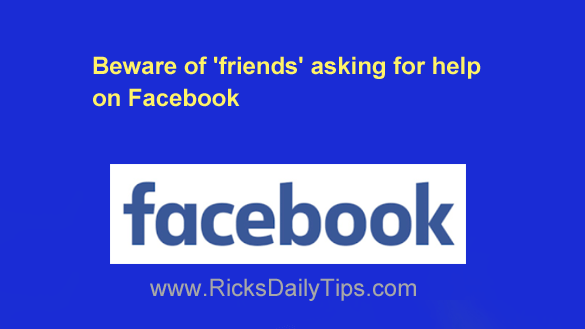
Facebook is one of the most visited websites on the Internet, and with over two billion registered users it’s a virtual gold mine for scam artists out to make an easy buck.
There are countless scams being perpetrated on Facebook at all times, but every now and then a particularly insidious one pops up.
The purpose of this post is to warn you about a scam that has cleaned out the bank accounts of at least three of my own Facebook friends.
The scenarios vary just a bit, but it usually works something like this…
You receive a friend request from someone you don’t know, but decide to accept it because he/she is already friends with several of your other friends.
You start talking to one another and quickly become pretty close friends (as Facebook friends go). Perhaps you even begin communicating outside of Facebook (phone, texting, etc.).
Over time you build up trust in your new friend as well as a certain amount of emotional attachment. Now they’re ready to strike because they sense that the iron is hot.
Your friend sends you a message or calls with the news that they’re going overseas for a long-awaited vacation. Once “there” they send regular reports about how nice the weather is, how beautiful the beach is, how great the food is.
You begin to actually enjoy the “vacation” along with them via their messages.
But then you receive a very different kind of message. They have been robbed or their hotel room has been ransacked. Their wallet/purse is gone, and so is all of their cash and credit/debit cards.
The local police are working on the case, but in the meantime they have no way of paying expenses, buying food or even returning home. They hate to ask, but could you possibly send some cash to see them through this crisis?
They’ll gladly pay you back when they get back home…
Although you have an uneasy feeling in your gut about the situation, you like the person and really want to believe them so you decide to do whatever you can to help. You wire them some money, or even worse, send them your bank account or credit/debit card information so they can withdraw just enough cash to make it back home.
The next thing you know your bank account is empty and/or your credit card is maxed out. You have been scammed, and good! Although you know the person needs to be stopped and sent to jail, you hesitate to tell anyone lest they believe you are an idiot.
If this ever happens to you, understand that you aren’t an idiot. You are a caring, trusting person who was taken advantage of in every way possible. Your new “friend” took advantage of your kindness, plain and simple.
In my opinion, you need to talk to the police and let them know that you were scammed. Any details you can provide such as email addresses, phones numbers, Facebook or other online service usernames just might help them track down the crook and put a stop to their thievery.
The chances of you getting your money back are probably slim to none, but it’ll be worth the hassle if you can help prevent this from happening to someone else.
If you haven’t already fallen victim to this scam, here are a few ways to prevent it from happening:
1 – Be careful who you accept friend requests from. I’m not saying you should never accept friend requests from strangers if the two of you have mutual friends. That’s called expanding your circle of friends, and it can often be a good thing in my opinion.
But that being said, you do need to make sure the person really is who they claim to be by checking out their profile and timeline carefully. If the info there is sparse or of a very generic nature, don’t accept the request.
If all that looks OK, contact a couple of your mutual friends and ask how they know the person, and for how long. If they “met” him just recently in the same manner you did, be very careful.
2 – Never, under any circumstances should you send money or details about your financial accounts to someone that you only “know” via the Internet, even if you have become extremely emotionally attached to the person. Simply tell them that you feel bad for their situation, but you simply are not in a position to be of help financially.
If the person is telling the truth (the odds of which are virtually zero), the American consulate in the other country and their own family will see to it that they get the help they need. That is not your job as a Facebook friend.
There are several variations of this scam, including one in which a scammer clones one of your real friends’ accounts and then uses the fake account to perpetrate a scam on you similar to the one described above.
In conclusion, it’s always wise to remember that the Internet is sort of like the Wild, Wild West.
There are bad guys/gals everywhere, and there is no Facebook sheriff to reign them in. You need to carry your own weapons (your wits and intuition) and use them to protect yourself from financial loss at all times.